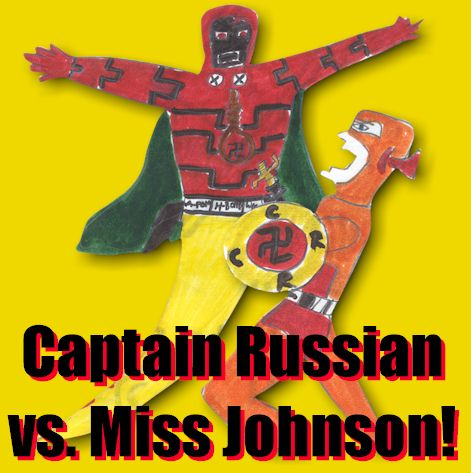
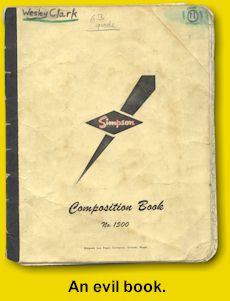 I was sometimes a deeply unhappy child in fifth and sixth grades at the Monterey Avenue Elementary School, mainly because of a bad relationship with a teacher I was unfortunate to have for both of those years, Miss Wilda Johnson. Even after 37 years (as of this writing) it pains me to recall my classroom experiences with her. But, Dear Reader, my Avocado Memories are not always happy and fond, and I should paint a complete picture.
I was sometimes a deeply unhappy child in fifth and sixth grades at the Monterey Avenue Elementary School, mainly because of a bad relationship with a teacher I was unfortunate to have for both of those years, Miss Wilda Johnson. Even after 37 years (as of this writing) it pains me to recall my classroom experiences with her. But, Dear Reader, my Avocado Memories are not always happy and fond, and I should paint a complete picture.
I still have in my possession my sixth grade composition book, a detested item in which every one of my classroom affronts was faithfully recorded in the "citizenship" section - page after page of them. Perhaps one or another of my fellow classmates was troublesome enough to warrant having an additional page stapled in. Mine had five additional pages. (You can click here to see a few pages.)
The correction process was always the same: I would be caught committing some offense. Miss Johnson then would tell me to "Put my name and problem on the (chalk) board." (How many times did I hear that phrase!) Then a stay at my desk well after the rest of the class was dismissed for the day. This involved a tiresome lecture from Miss Johnson. Often a one to six-sided work paper would be required of me, based on some self-improving sentence written over and over again. She would look it over, issue some unconvincing sentiment about how she hoped this would be the last time, and release me. I would then cross the deserted school yard to my bicycle and pedal home.
Looking back at it, it is difficult to understand how some of Miss Johnson's complaints are valid citizenship issues; they seem like pettifogging harassment instead.
11/1/1967: Playing bells with stick and at wrong time (another the next day)
11/8/1967: Drawing on name tag
11/21/1967: Making faces at Debbie
11/28/1967: Going to music practice at wrong time
11/30/1967: Drawing on book mark
12/8/1967: Laughing during Christmas show
1/11/1968: Touching neighbor's eraser
1/16/1968: Making faces while singing
1/17/1968: (Again!) Giggling while Mrs. Wilkerson was singing
2/26/1968: TV time poor posture
3/7/1968: Forgot composition book
4/1/1968: Lack of playground participation
5/8/1968: Wouldn't let neighbor see pen
To be sure, I could be a real pain. I was an immature child for my age, and was always acting up. In fact, I was the class clown. But my giggling during one of Mrs. Wilkerson's performances in comic over-vibrato or not letting a neighbor view my pen were hardly indicative of a career as a thief or murderer. And I am proud to state for the record, contrary to Miss Johnson's implied predictions, I have never spent a night in a jail cell.
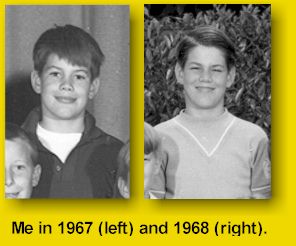 From September 1967 to June 1968 there are a total of 158 citizenship problems documented, total - most of them involving either talking or drawing on something I wasn't supposed to be drawing upon. (My Spanish name for the Spanish language television broadcasts was "Nacho." I didn't especially value my name tag.)
From September 1967 to June 1968 there are a total of 158 citizenship problems documented, total - most of them involving either talking or drawing on something I wasn't supposed to be drawing upon. (My Spanish name for the Spanish language television broadcasts was "Nacho." I didn't especially value my name tag.)
The multiple citizenship affronts I remember most vividly involved my not performing my "presidential responsibilities." Being the class scapegrace brought with it a certain amount of respect or acknowledgement from my fellow students, much in the same way that Mark Twain described for the village pariah Huckleberry Finn. (When Richard and I played at being Tom Sawyer and Huck, it was natural for me to be Huck.) My classmates elected me to be the class treasurer. I rose up through the ranks at the end of sixth grade to become the class president - something that must have rankled Miss Johnson to no end. She couldn't prevent it from happening without causing a classroom constitutional crisis. What she could do and did, however, was insist that I stand up in front of the class every morning and lead the class in "America the Beautiful." It was my presidential responsibility.
The problem insofar as I was concerned, however, was that I was going through puberty at this time and had a terrible case of acne. (You will notice that in the 1968 photo of me, on the left, my hair is combed off of my forehead. This was an attempt to minimize problems with the oily skin I inherited fom my mother. There were also all sorts of astringents, treatments and medications - none of which worked. Relief only came with the passage of time.) I can recall adults and other kids talking to me and my avoiding eye contact, hoping that this would cause an end to the conversation and the painful humiliation of my face possibly being looked at. Another problem was that at this time I had a perpetually dry throat. Add the two things together and it becomes obvious that the very last thing I wanted to do was to get up in front of the class and sing.
I still have my Burbank Unified School District health record - one of the permanent records school administrators are said to be so threatening about in comedy skits. The entry for May 15th, 1968 says it all: "Wes has a problem with his voice. It is husky and he says his throat is dry most of the time . Has citizen problem, counseling urged. Mother contacted Dr. Steele who examined Wes and felt condition was neurotic. Dr. Steele phoned nurse and urged that pressure at school be removed. He has referred him to UCLA for psychiatric counseling." (I never went and the pressure was never removed.)
 Once, Miss Johnson dropped the pretense of being a caring educator and let her true feelings for me show. On 3 April 1968 (the date is documented for the ages in my citizenship record) I called a classmate a "brontosaurus." Hardly fighting words, but this particular kid had an aggression problem and responded by hitting me in the face, hard. (He was an especially out-of-control kid - in fact, he was second place only to me in the number of pages stapled to his composition book. Miss Johnson seemed to dislike boys. After high school we both enlisted in the Marines, and he became a title holder in Marine Corps league boxing!) Who got into trouble for the brontosaurus affair? The teacher's chief object of scorn, me. And I have never forgotten the bile and tone of viciousness in Miss Johnson's after-school lecture to me that day, which contained this statement: "Wesley, I hope that the next time you call some boy a name he beats you into a bloody pulp." A girl, Diane Manley, who was sitting in the classroom for some reason other than punishment looked up at me from across the room horrified, and I felt two simultaneous sensations: 1.) Terrific shame and insult at Miss Johnson's stinging words, and 2.) Gratification that, at last, one of my fellow classmates understood firsthand the misery I went through nearly every day after school - the cost of being the class clown.
Once, Miss Johnson dropped the pretense of being a caring educator and let her true feelings for me show. On 3 April 1968 (the date is documented for the ages in my citizenship record) I called a classmate a "brontosaurus." Hardly fighting words, but this particular kid had an aggression problem and responded by hitting me in the face, hard. (He was an especially out-of-control kid - in fact, he was second place only to me in the number of pages stapled to his composition book. Miss Johnson seemed to dislike boys. After high school we both enlisted in the Marines, and he became a title holder in Marine Corps league boxing!) Who got into trouble for the brontosaurus affair? The teacher's chief object of scorn, me. And I have never forgotten the bile and tone of viciousness in Miss Johnson's after-school lecture to me that day, which contained this statement: "Wesley, I hope that the next time you call some boy a name he beats you into a bloody pulp." A girl, Diane Manley, who was sitting in the classroom for some reason other than punishment looked up at me from across the room horrified, and I felt two simultaneous sensations: 1.) Terrific shame and insult at Miss Johnson's stinging words, and 2.) Gratification that, at last, one of my fellow classmates understood firsthand the misery I went through nearly every day after school - the cost of being the class clown.
I once read a psychiatric article that stated that childhood experiences are often so vivid and heightened that people create profound memories, likes and dislikes based on them for the rest of their adult lives. So it is for Diane Manley. Sometime after the brontosaurus incident while we were doing some kind of study in another room, I was once again singled out for misbehavior. Miss Johnson told me to take a seat at a table across the room - far away from where the other students were sitting. My isolation was obvious and uncomfortable. A few minutes later, however, Diane Manley took up a seat at the table across from me and shared my exile, smiled, and quietly began reading her book. It was a simple gesture, but I was immensely grateful and have never forgotten it. And I never said anything to her about it, either.
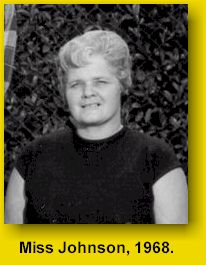 (This same Diane Manley was a girl jock in high school. Once in a hallway my pal Mike, against my repeated warnings, fired an unfolded paperclip at her rear end from a rubber band. "Twack!" Diane wheeled around and must have seen fear in Mike's face, for she strode up to him and started kicking him hard in the leg - which he had injured a few days previously. "Told you so," I said, as she walked away. Mike collapsed in a corner, on his face an expression of pain.)
(This same Diane Manley was a girl jock in high school. Once in a hallway my pal Mike, against my repeated warnings, fired an unfolded paperclip at her rear end from a rubber band. "Twack!" Diane wheeled around and must have seen fear in Mike's face, for she strode up to him and started kicking him hard in the leg - which he had injured a few days previously. "Told you so," I said, as she walked away. Mike collapsed in a corner, on his face an expression of pain.)
As class president it was another presidential responsibility to present Miss Johnson with a gift, to be decided upon by a committee of which I was a member. We decided to give her a pair of shoes. I presented them to her in class. While she thanked everyone for the thoughtful gift, I recall mentally hoping that they would prove to be tight and cause painful blisters.
Thank goodness for Mr. Derrick, the Monterey Avenue Elementary School janitor. I mention him elsewhere, and the influence he had in developing my interest in classical music. He also instituted a little program with me in sixth grade, wherein he would leave me an index card with a big word written on it. On the back I would write the definition of the word, and the very next time I saw him I'd have to use the word in a sentence. While I cannot say that I remember any of the index card words he gave me, I do certainly remember the one time he correctly pronounced a word I had heard a lot at home, "bastard." (Mom always pronounced it "bastid.") It was on the occasion of my putting a basketball in a urinal and pulling the flush handle (the composition book entry for 5/2/1968 is here). Mr. Derrick walked into the boy's restroom, took one look at me, the urinal and the basketball and slowly said, "You bastard." He busted me and I had to "Put my name and problem on the board." Despite being ratted out, I am grateful for the extra consideration he gave me during a troubled time in my life. I think he must have realized how hard Miss Johnson was on me, and lent me what encouragement he could.
Coincidentally, according to the composition book my Reign of Terror in sixth grade reached a peak on that date, May 2nd, 1968. I had no less than five citizenship problems listed for that one day: "Playing with protractor," "Behavior report not clear" (the word "clear" was crossed out and Miss Johnson wrote "honest" - apparently I was caught lying about something, but I forget what), "Pan-American paper not right" (an academic problem and not a behavioral one - or so one might think), the aforementioned "Bathroom problem (flushing when ball was in toilet)" and "Spelling paper not in." My wife figures Miss Johnson probably had PMS that day.
As one might expect, towards the end of sixth grade I simply quit trying academically and behaviorally, and took a perverse sort of pride in the number of citizenship problems listed in my composition book. 100 problems, 150 problems - why not try for 200? I got a C in art - normally an A was easy for me - and in the five behavior categories I got all U' s (unsatisfactory). I got a good grade in reading, but that's only because I was increasingly taking refuge in books. It appeared to me that nothing I did resulted in anything other than after school sessions of filling ruled paper with corrective sentences over and over again, so there was nothing for it other than to await the end of the school year and my day of deliverance, which finally came.
I have considered throwing my composition book away and simply forgetting about those years, but I have saved it in consideration of the fact that life contains important lessons during the bad times as well as the good. (Perhaps more to be had during the bad times.) One trait that developed during my Johnson years was my appreciation of Fridays, to this day my favorite day of the week. I always had to stay after class less often on Fridays than any other day of the week, and I was never sure why. I supposed that I was somehow better behaved on Fridays, but my rational adult mind tells me that Johnson probably wanted to get home early at the end of the week. I recall Mondays pretty clearly, and my thorough depression at having to begin another week of school. On one especially gray morning on the way to school, the background music from an Alka-Seltzer ad was running through my head - a morose little theme that I can still hum; it went with a description of stomach acid. At the time it struck me as being a sort of theme song for sixth grade.
I describe my problems with heartburn in an article I wrote about Rolaids. These problems began in 1967, when I was in fifth grade. I recall drawing a Ratman comic and badly wanting ice cream or milk to staunch the pain. Looking at it in retrospect, and considering my "neurotic" condition, I suppose I might have developed a juvenile ulcerative problem of some kind. 36 years later, after an endoscopic examination of my esophagus (my doctor had become concerned when I told him how many antacids I usually took), the specialist asked me if I knew that I had once had an ulcer... no, but it didn't surprise me.
CAPTAIN RUSSIAN
 My greatest solace during the Johnson years was comic books, especially creating them myself. I drew a number of knock-offs from established titles: The Foney Four (from Marvel's Fantastic Four), Captain Tin (from Marvel's Iron Man), Superdud (do I have to say?). I also created a few of my own, like N-Man (The "N" stood for "neutron" - he was radioactive. My superheroes had a habit of wandering around near atomic explosions.) However, I was never able to come up with a convincing version of Batman. The character was just too complex and dark, and, what's more, I respected him too much. The best I could manage was Ratman, who was pathetic and only got three comics.
My greatest solace during the Johnson years was comic books, especially creating them myself. I drew a number of knock-offs from established titles: The Foney Four (from Marvel's Fantastic Four), Captain Tin (from Marvel's Iron Man), Superdud (do I have to say?). I also created a few of my own, like N-Man (The "N" stood for "neutron" - he was radioactive. My superheroes had a habit of wandering around near atomic explosions.) However, I was never able to come up with a convincing version of Batman. The character was just too complex and dark, and, what's more, I respected him too much. The best I could manage was Ratman, who was pathetic and only got three comics.
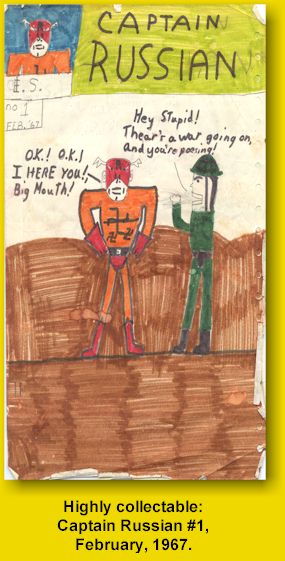 My very first series of comic books were drawn in fourth grade, and they roughly coincided in time with the premier of the Batman TV series in September, 1966. I called my superheroes Fatman and Blubber - an obvious rip-off. The format was a sheet of college-ruled paper cut into sections 2 1/2" x 3"; the art and stories were exceedingly minor as well. But as cheesy as they were, they had one distinction - one of them was read and critiqued by none other than William Shatner.
My very first series of comic books were drawn in fourth grade, and they roughly coincided in time with the premier of the Batman TV series in September, 1966. I called my superheroes Fatman and Blubber - an obvious rip-off. The format was a sheet of college-ruled paper cut into sections 2 1/2" x 3"; the art and stories were exceedingly minor as well. But as cheesy as they were, they had one distinction - one of them was read and critiqued by none other than William Shatner.
At the time my mother worked in a coffee shop on Hollywood and Western in Hollywood, not far from the Desilu Studios. One day, while filming first season episodes of Star Trek, William Shatner and Leonard Nimoy sat down to lunch at one of Mom's tables, dressed in their Star Trek costumes. Mom asked why they were dressed that way, they explained, and, knowing I would be interested because Star Trek dealt with space, asked them for autographed photos for me. I still have them. A knowledgeable Trekkie tells me that the one of Spock is especially valuable, since it is signed "Greetings from Spock - Leonard Nimoy." After he became famous for the part he stopping signing Spock with his name, and began distancing himself from the character. Anyway, Mom gave Shatner one of my Fatman and Blubber comics to evaluate, and Shatner's considered opinion was, "Good, but it needs more characters."
My favorite comic book creation wasn't even mine, entirely. In February 1967, when spending a Friday night over at my house, Jimmy Rutherford and I more or less spontaneously started drawing comic books. Jimmy came over with a big pile of computer printer paper that we could fold in half to make a cover (his mom worked in a bank and had an unlimited supply); the pages of the comics were folded 8 " by 11" paper. We had cheap felt tip markers to do the covers in full color; the pages were almost always in black pencil on paper. My comic book company was "E.S." - which stood for "Exciting Stories"; a major case of fraudulent advertising. I forget what Jimmy called his.
We came up with a knock-off for Captain America we called Captain Russian. (To us, the Russians were the opposite of the Americans. We didn't know enough about geopolitics to realize that we were really talking about the Soviet Union.) Just because we boys got a kick out of drawing them - World War II productions being popular - our Captain Russian wore a swastika on his chest. (Once again, being ignorant of history, we didn't realize that the Soviet Union fought the Nazis in World War II.) To finally confuse things, I always drew the traditional swastika and not the reversed one Hitler devised. Captain Russian couldn't possibly have been more politically incorrect.
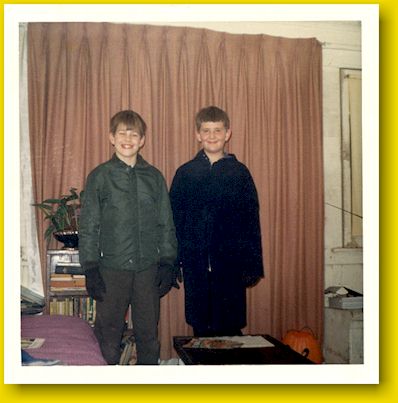
In 1967 Marvel's Captain America was scripted by Stan Lee and drawn by Jack Kirby, and these comics are now regarded as being minor masterpieces. Captain America was noble, strong-willed, patriotic, and despite having no super powers, a truly fearsome warrior. An all-around hero. My Captain Russian was, in a word, a loser. While Captain America, engaged in a mighty struggle, told himself motivational things like, "I can't lose now not while there is still breath left in me..." Captain Russian muttered self-defeating things like, "Can't win now - not while I'm losing!" In a way, his persona mirrored my own in Miss Johnson's class, and my battered ego became Captain Russian's.
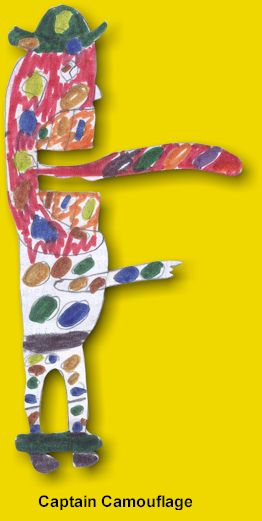 Jimmy and I agreed that while he was the superior artist I was the better story man. The fact of the matter, however, was that Jimmy was far more gifted creatively than I, and could dash out an interestingly-drawn, clever story while I was still plodding though the first couple of boxes of action. His Captain Russian story, now lost, was far better than mine. Not able to think of a new story line for myself at first, I adapted Jimmy's. The plot centered around life in Camp Russian, a military camp somewhere - we never said where. Captain Russian (Steve Polders in real life) was introduced to a truly freakish apparition, Captain Camouflage, and given the assignment to render a Jeep more or less invisible in the field. Captain Russian naturally opted for a lime, purple and pink color scheme.
Jimmy and I agreed that while he was the superior artist I was the better story man. The fact of the matter, however, was that Jimmy was far more gifted creatively than I, and could dash out an interestingly-drawn, clever story while I was still plodding though the first couple of boxes of action. His Captain Russian story, now lost, was far better than mine. Not able to think of a new story line for myself at first, I adapted Jimmy's. The plot centered around life in Camp Russian, a military camp somewhere - we never said where. Captain Russian (Steve Polders in real life) was introduced to a truly freakish apparition, Captain Camouflage, and given the assignment to render a Jeep more or less invisible in the field. Captain Russian naturally opted for a lime, purple and pink color scheme.
Captain Camouflage was so dedicated to his craft that he painted himself in concealing paint from head to foot, including teeth, tongue and, occasionally, the whites of his eyes. (Indeed, the key to understanding the secret identity of a villain in one of my stories was in realizing that he had painted teeth. "Who is he? The clue is on the cover!") You may note on the image at left that his lowered trousers - dropped due to the force of his voice - reveal camouflaged underwear and legs. When Captain Camouflage yelled at the hapless Captain Russian, which was frequently, his mouth heightened alarmingly, and his great painted camouflaged tongue extended in the manner of one of the "Weird-Ohs" toys of the day. What is really odd about the character, however, is that to this day, despite the fact that I have written the word many times in the 46 issue run of Captain Russian, I cannot spell the word "camouflage" correctly without a spell-checker.
Captain America had a kid sidekick named Bucky, so, while I disliked kid sidekicks intensely, feeling it was somehow required I nonetheless gave Captain Russian Russian Lad. And killed him off. One of my self-written letters to the editor in the final issue was, "What happened to Russian Lad? He hasn't been in the last few issues." Answer: "While jogging in front of a tank range he took a 55 lb. ball in the chest and croaked. Sorry. (He was kind of a punk kid anyway.)"
 Perhaps the most psychologically significant Captain Russian story I ever wrote was issue #39 in June 1968, when he battled with an armored - and sexually indeterminate - Miss Johnson ("She's worse than Adolf Hitler!"). My artwork attempted to convey as much dread as possible: a sinister Doctor Doom-style mask, battleship armor, a sword, a pistol in a holster, a utility belt containing a hydrogen bomb and an especially fearsome logo consisting of a swastika within a hangman's noose. The origin story revealed that a horribly disfigured man was under the armor. Read from that what you will.
Perhaps the most psychologically significant Captain Russian story I ever wrote was issue #39 in June 1968, when he battled with an armored - and sexually indeterminate - Miss Johnson ("She's worse than Adolf Hitler!"). My artwork attempted to convey as much dread as possible: a sinister Doctor Doom-style mask, battleship armor, a sword, a pistol in a holster, a utility belt containing a hydrogen bomb and an especially fearsome logo consisting of a swastika within a hangman's noose. The origin story revealed that a horribly disfigured man was under the armor. Read from that what you will.
Notice also that like N-Man, "Brute" Morgan turned into Miss Johnson by wandering onto an atomic test site (exciting excerpt here).
My last issue of Captain Russian was #46, written in 1979. (But I really quit drawing comic books about the same time I quit reading them - in 1969.) This last fling was a year after I had been discharged from the Marine Corps. I was 23. Camp Russian looked a lot like Camp Pendleton in Southern California, the art was an improvement over what I could do as a twelve-year-old, the bad guy told unsuccessful subordinates to report to microwave chambers, and characters occasionally used four-letter words. Significantly, Captain Russian was no longer a loser. He was self-effacing, with a sense of humor and a generally upbeat view of life. True, he was still clumsy and inadvertently destructive, but any rematch between him and Miss Johnson would have a foregone conclusion.
Some of my self-drawn comic books
Fatman and Blubber #1: "The Rocket" (1966)
Captain Russian #2 (March 1967)
N-Man #1 (February 1967)
Captain Tin #1 (Spring 1967)
Captain Russian #41: "Captain Russian Meets the Mafia" (September 1968)
Captain Russian #44: "War on Poland Hill" (Summer 1969)
"Captain Russian and the Adventure of the Mummy Ring" (1985, unfinished - I was bored out of my mind during a week long contracts class)
The Foney Four (Issues 12-15; 1968)
A page from an autobiography Johnson had us working on. The illustration page.
Scanned sixth grade composition book
Time marches on, and so does technology. Using artificial intelligence I was able to create realistic images of Captain Russian and his friends! (Scroll down.)
Fatman and Blubber get the photo realism treatment! (Scroll down.)
Captain Tin is visually brought to life! (Scroll down.)
Behold the awesome (and messy) neutronic power of the visually realized N-Man! (Scroll down.)